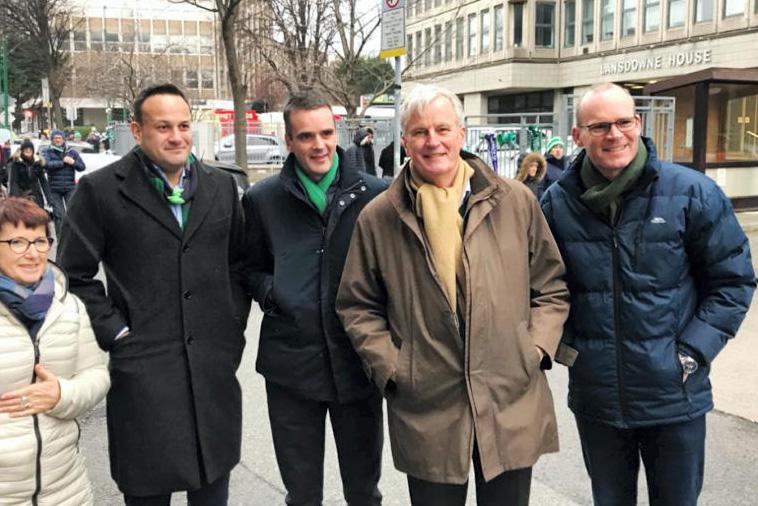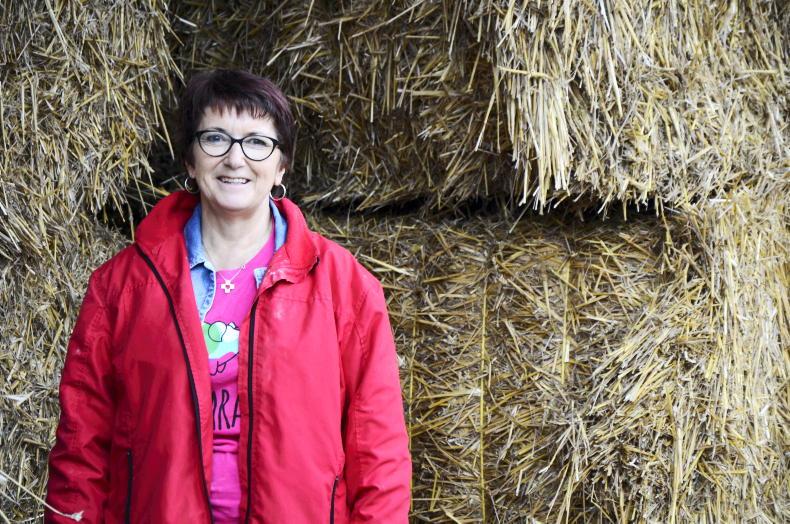Back in March 2019, the Irish rugby team convincingly defeated their French opponents 26-14 in the Aviva stadium. Even that strong scoreline was a point shy of Ireland’s victory last Saturday. I remember that the photo that appeared on the front of The Irish Times the following day caused some consternation.
This was not due to any furore between the sporting rivals but the political sensitivities of Brexit at that time. Pictured was then Tánaiste Simon Coveney, EU chief Brexit negotiator Michel Barnier, then IFA president Joe Healy and then and now Taoiseach Leo Varadkar.

Christiane Lambert, the president of the French federation of farm organisations, Taoiseach Leo Varadkar, IFA president Joe Healy, EU chief Brexit negotiator Michel Barnier and Simon Coveney on the way to the Ireland-France rugby game. \ Chris Donoghue/Twitter
Also in the picture, holding up the left flank, was the leader of the French farm lobby FNSEA, Madame Christiane Lambert. Eighteen months later, in peak COVID-19, she was elected as president of COPA, the umbrella body that represents over 22 million European farmers and their families.
Aside from whether you agree or disagree with the appropriateness of Barnier’s decision to attend the match with Irish politicians, there is another point of note about the image. That is the access that farm leaders at both Irish and EU level have to the people in decision-making positions. This didn’t and doesn’t happen overnight. When I met with Christiane in Brussels just before Christmas, it was very apparent the commitment it has taken over many decades to get into that photo and represent farmers at that level.

EU farm organisation COPA President, french tillage and pig farmer Christiane Lambert.
Christiane started at a junior level in the local young farmers, progressing before taking time out for family and then re-entering the fray. But how many more Christiane Lamberts will be willing to dedicate their life to farming or any form of politics.
When I spoke with ex-Minister for Agriculture Mary Coughlan (read back online), she referenced how difficult it is to get people to step up for politics or voluntary organisations. Time being one factor but also that “people feel that once you put your head over the parapet, somebody’s going to knock you straight off of it”.
With local, EU, and potentially also a general election occurring in 2024, all Government parties are looking for candidates. Indications suggest they are coming up short. Although there are positive initiatives to increase female participation in politics, for example organisations like Women for Election and the 40% gender quota, the well-covered experience of some reflects poorly on a career in politics.
An official inquiry was launched following the release of a video of the Finnish Prime Minister Sanna Marin dancing at a party. Forced to take a drug test, she was ultimately cleared of any “unlawful conduct” or “neglect of her official duties”. In support, women around the world posted pictures of themselves dancing, actually boosting her popularity.
Side note: for more on dancing, parenting expert Rebecca Lenehan is advising parents on how to navigate the minefield that is the teenage disco. Another high profile woman in politics to be criticised of late was New Zealand’s Jacinda Ardern.
Having led her country through a volcano, the 2019 terror attack on a Christchurch mosque and the COVID-19 pandemic, she stepped down saying that she no longer had “enough in the tank”.
However, it was not the weight this political turmoil would have taken on her or her depleting popularity that this decision was attributed to, but to her being a woman.
Ardern was always open about the strains of her office but many people – seeing clearly how public life affects private life – will not be willing to take on those strains. This will become a global political problem unless addressed.
Read more
Editorial: the eternal Irish love affair with land
Business failure rate rising again post COVID. Is a ‘correction’ gathering pace?
Back in March 2019, the Irish rugby team convincingly defeated their French opponents 26-14 in the Aviva stadium. Even that strong scoreline was a point shy of Ireland’s victory last Saturday. I remember that the photo that appeared on the front of The Irish Times the following day caused some consternation.
This was not due to any furore between the sporting rivals but the political sensitivities of Brexit at that time. Pictured was then Tánaiste Simon Coveney, EU chief Brexit negotiator Michel Barnier, then IFA president Joe Healy and then and now Taoiseach Leo Varadkar.

Christiane Lambert, the president of the French federation of farm organisations, Taoiseach Leo Varadkar, IFA president Joe Healy, EU chief Brexit negotiator Michel Barnier and Simon Coveney on the way to the Ireland-France rugby game. \ Chris Donoghue/Twitter
Also in the picture, holding up the left flank, was the leader of the French farm lobby FNSEA, Madame Christiane Lambert. Eighteen months later, in peak COVID-19, she was elected as president of COPA, the umbrella body that represents over 22 million European farmers and their families.
Aside from whether you agree or disagree with the appropriateness of Barnier’s decision to attend the match with Irish politicians, there is another point of note about the image. That is the access that farm leaders at both Irish and EU level have to the people in decision-making positions. This didn’t and doesn’t happen overnight. When I met with Christiane in Brussels just before Christmas, it was very apparent the commitment it has taken over many decades to get into that photo and represent farmers at that level.

EU farm organisation COPA President, french tillage and pig farmer Christiane Lambert.
Christiane started at a junior level in the local young farmers, progressing before taking time out for family and then re-entering the fray. But how many more Christiane Lamberts will be willing to dedicate their life to farming or any form of politics.
When I spoke with ex-Minister for Agriculture Mary Coughlan (read back online), she referenced how difficult it is to get people to step up for politics or voluntary organisations. Time being one factor but also that “people feel that once you put your head over the parapet, somebody’s going to knock you straight off of it”.
With local, EU, and potentially also a general election occurring in 2024, all Government parties are looking for candidates. Indications suggest they are coming up short. Although there are positive initiatives to increase female participation in politics, for example organisations like Women for Election and the 40% gender quota, the well-covered experience of some reflects poorly on a career in politics.
An official inquiry was launched following the release of a video of the Finnish Prime Minister Sanna Marin dancing at a party. Forced to take a drug test, she was ultimately cleared of any “unlawful conduct” or “neglect of her official duties”. In support, women around the world posted pictures of themselves dancing, actually boosting her popularity.
Side note: for more on dancing, parenting expert Rebecca Lenehan is advising parents on how to navigate the minefield that is the teenage disco. Another high profile woman in politics to be criticised of late was New Zealand’s Jacinda Ardern.
Having led her country through a volcano, the 2019 terror attack on a Christchurch mosque and the COVID-19 pandemic, she stepped down saying that she no longer had “enough in the tank”.
However, it was not the weight this political turmoil would have taken on her or her depleting popularity that this decision was attributed to, but to her being a woman.
Ardern was always open about the strains of her office but many people – seeing clearly how public life affects private life – will not be willing to take on those strains. This will become a global political problem unless addressed.
Read more
Editorial: the eternal Irish love affair with land
Business failure rate rising again post COVID. Is a ‘correction’ gathering pace?








 This is a subscriber-only article
This is a subscriber-only article










SHARING OPTIONS: